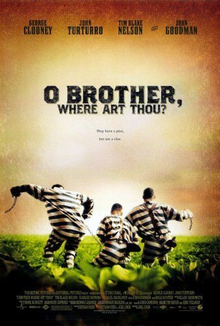The film is set in 1937 rural
Mississippi during the
Great Depression. Its story is a modern
satire loosely based on
Homer's epic poem
The Odyssey that incorporates mythology from the American South. [...] the movie deals with the picaresque adventures of [three convicts] Ulysses Everett McGill and his companions Delmar and Pete [...]. Sprung from a chain gang and trying to reach Everett's home to recover the buried loot of a bank heist they are confronted by a series of strange characters--among them sirens, a cyclops, bank robber George "Baby Face" Nelson (very annoyed by that nickname), a campaigning governor and his opponent, a KKK lynch mob, and a blind prophet who warns the trio that "the treasure you seek shall not be the treasure you find."
Much of the music used in the film is period
folk music, including that of
Virginia bluegrass singer
Ralph Stanley. The film received positive reviews, and the soundtrack won a
Grammy Award for Album of the Year in 2001 using
American folk music. The country and folk musicians who were
dubbed into the film included
John Hartford,
Alison Krauss,
Emmylou Harris,
Gillian Welch,
Chris Sharp,
Patty Loveless, and others. They joined together to perform the music from the film in a
Down from the Mountain concert tour which was filmed for TV and DVD.
[...]The musical selection also includes religious music, including
Primitive Baptist and
traditional African American gospel, most notably
the Fairfield Four, an
a cappella quartet with a career extending back to 1921 who appear in the soundtrack and as gravediggers towards the film's end. Selected songs in the film reflect the possible spectrum of musical styles typical of the old culture of the American South: gospel,
delta blues,
country,
swing and bluegrass.
The use of
dirges and other macabre songs is a theme that often recurs in Appalachian music ("O Death", "Lonesome Valley", "
Angel Band", "I Am Weary") in contrast to bright, cheerful songs ("Keep On the Sunny Side", "In the Highways") in other parts of the film.
The version of "I'll Fly Away" heard in the film is performed not by Krauss and Welch (as it is on the CD and concert tour), but by the
Kossoy Sisters with
Erik Darling accompanying on long-neck five-string banjo, recorded in 1956 for the album
Bowling Green on
Tradition Records.



